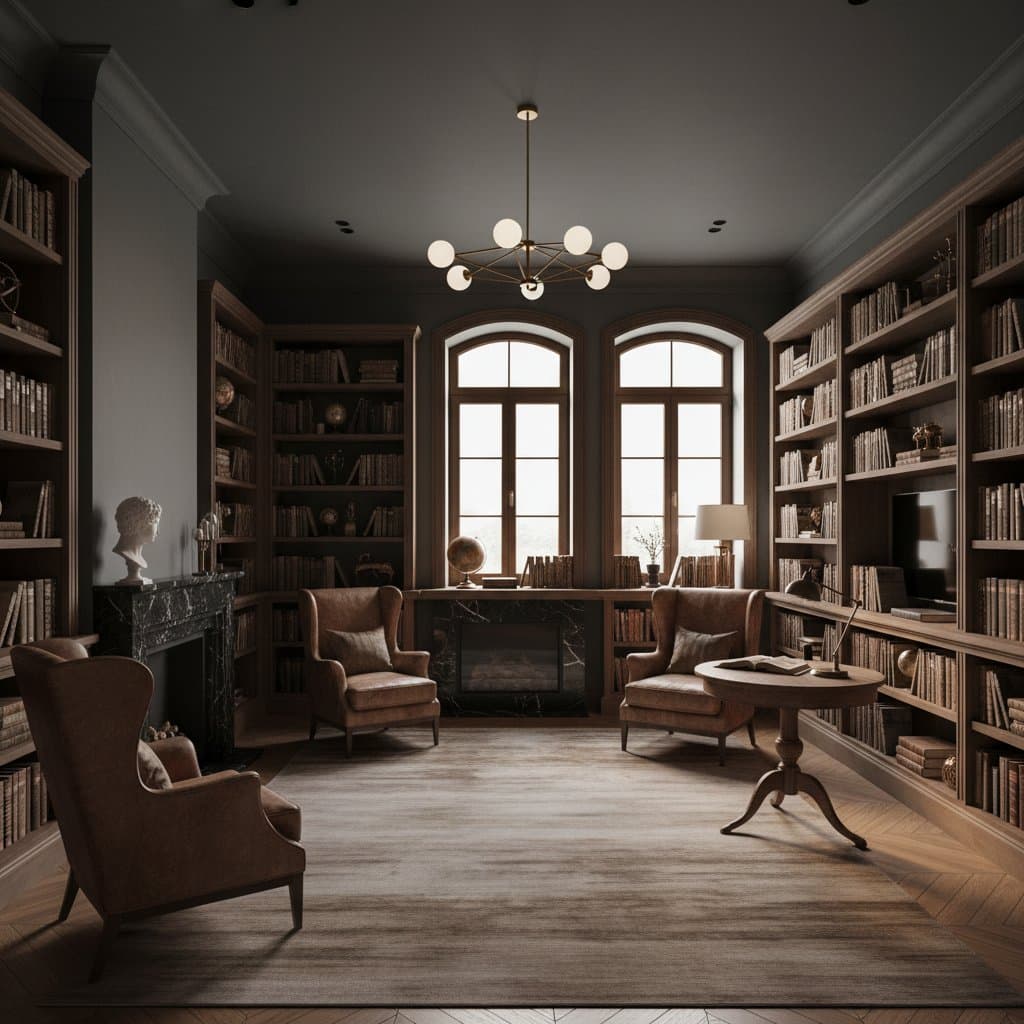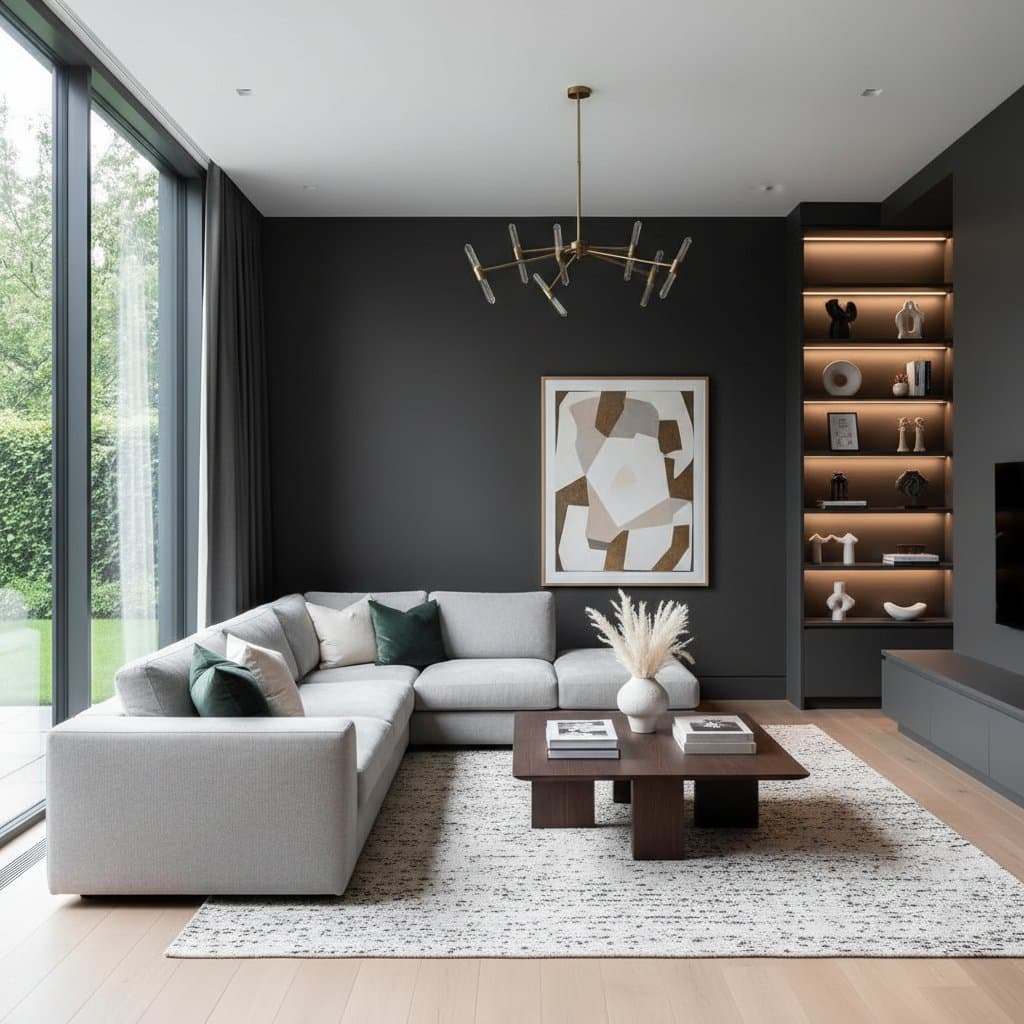2025's Moody Interiors: How Dark Paint Accelerates Home Sales
Dark paint enriches room aesthetics, fostering a sense of calm and luxury. Real estate professionals report that properties featuring moody interiors receive higher online engagement and stronger buyer offers. Deep colors convey confidence and completeness, leaving lasting impressions on potential purchasers.
For sellers preparing listings or homeowners seeking refreshed spaces, dark paint offers an efficient solution. This approach costs less than professional staging, requires only a few days for completion, and alters perceptions immediately upon entry.
Selecting Dark Paint Colors for Maximum Market Appeal
The term 'dark paint' evokes images of stark black walls, yet effective choices involve nuanced shades. Below are proven categories that enhance salability, each suited to specific room functions and buyer preferences.
Charcoal Gray
This versatile tone provides balance and timelessness, pairing seamlessly with wood accents or metal fixtures. It suits living rooms, home offices, and primary bedrooms, where subtlety elevates perceived value.
Navy Blue
A classic option that exudes tranquility, navy appears upscale against white trim and light flooring. It performs well in bathrooms and dining areas, drawing attention to architectural details.
Forest Green
Sophisticated and grounded, this earthy hue complements warm wood elements in bedrooms or kitchens. It adds warmth without overwhelming, appealing to buyers seeking natural serenity.
Deep Taupe
Neutral yet atmospheric, deep taupe supports resale flexibility while suggesting bespoke design. It integrates smoothly in hallways or open-plan layouts, unifying diverse spaces.
Soft Black
Approaching true black without intensity, this shade introduces drama selectively. Apply it to accent walls or built-in features for impact without diminishing room scale.
Understanding Painting Costs for Dark Shades
The expense of applying dark colors aligns closely with lighter ones, though additional coats or primer can increase labor. The following table outlines typical investments.
| Task | Typical Cost | What Affects Price |
|---|---|---|
| DIY painting (per room) | $80 to $200 | Paint quality, wall dimensions, coat count |
| Professional painting (per room) | $350 to $900 | Ceiling height, surface condition, trim details |
| Primer (per gallon) | $15 to $30 | Required for shifts from light or glossy bases |
| Paint (per gallon) | $30 to $70 | Brand reputation, finish type, pigment intensity |
Key factors influencing total costs include the need for multiple layers with darker pigments and the choice of finishes like eggshell or satin, which enhance light reflection at a modest premium. Older surfaces often demand preparatory patching or sanding, further elevating expenses.
To optimize budgets, apply high-quality primer to minimize subsequent coats. Bundle multiple rooms into a single project to streamline labor. Opt for mid-tier paint brands that deliver robust coverage through concentrated pigments.
DIY Application Versus Professional Services
Dark paints highlight imperfections such as brush marks or roller inconsistencies, underscoring the importance of preparation and technique.
Consider DIY for projects where you possess reliable painting skills, standard ceiling heights prevail, and minor touch-ups pose no issue.
Engage professionals when dealing with textured walls, high ceilings, or time-sensitive sales requiring impeccable results for photography. Deep navies or matte blacks demand uniform application, where experts excel in precise edging, primer selection, and consistent sheen.
Professionals also expedite cleanup and manage intricate trim, justifying their fee in larger homes or detailed environments.
Psychological and Visual Impacts of Dark Colors
Contrary to common assumptions, dark paint does not inherently shrink spaces. Instead, it softens boundaries, allowing walls to recede and fostering intimacy. A compact office in charcoal gains a cocoon-like privacy, while a spacious living room in navy achieves grounded elegance.
Achieve harmony by contrasting dark walls with light ceilings and trim. Incorporate mirrors, metallic accents, or neutral furnishings to bounce light effectively, ensuring openness.
Room orientation influences outcomes significantly. South-facing areas accommodate bold depths effortlessly. For north-facing rooms, select warmer undertones such as greens or plums to counteract potential chill.
Essential Safety Measures and Regulatory Considerations
Most painting tasks bypass permit requirements, yet adherence to safety protocols remains crucial.
Maintain ventilation by opening windows during application. Don Gloves and masks protect against dust from sanding or primer fumes. Shield floors and electrical outlets thoroughly.
Dispose of excess paint responsibly through designated recycling facilities, avoiding drains or sewers.
In pre-1978 homes, conduct lead testing prior to any sanding. Positive findings necessitate certified abatement services; refrain from personal scraping or heating methods to prevent health risks.
Pitfalls to Sidestep in Dark Paint Projects
Omit primer at your peril, as it results in blotchy finishes and prolonged application.
Restrict flat black to limited areas, given its light absorption and vulnerability to marks.
Coordinate trim selections carefully; crisp white or soft cream maintains visual clarity.
Avoid painting under suboptimal lighting, which conceals streaks—daylight sessions ensure accuracy.
Validate undertones with sample swatches in actual room conditions before committing to full quantities.
Strategic foresight transforms potential gloom into balanced allure.
Strategic Timing for Pre-Sale Repainting
Address visible wear, discoloration, or inconsistent repairs by refreshing walls prior to listing. Neutral deep tones like charcoal, navy, or taupe invite personalization without alienating tastes, outperforming vibrant alternatives.
In open-concept designs, apply a unified scheme across adjoining areas to amplify spatial flow and cohesion during viewings.
Long-Term Care for Dark-Painted Surfaces
While dark walls conceal dust effectively, they accentuate scuffs and scratches. Store touch-up paint in sealed, labeled containers for quick access. Employ mild cleaners with soft applicators, steering clear of abrasive techniques that alter sheen.
Matte or chalk finishes in high-use zones may require renewal every few years. Satin or eggshell variants endure longer, facilitating straightforward maintenance.
Realizing Faster Sales Through Moody Transformations
Embracing dark paint in 2025 equips homes with an edge in competitive markets. These shades not only captivate visually but also evoke emotional resonance, prompting quicker decisions from buyers. Implement these insights to elevate listings, reduce time on market, and maximize returns with minimal investment.








